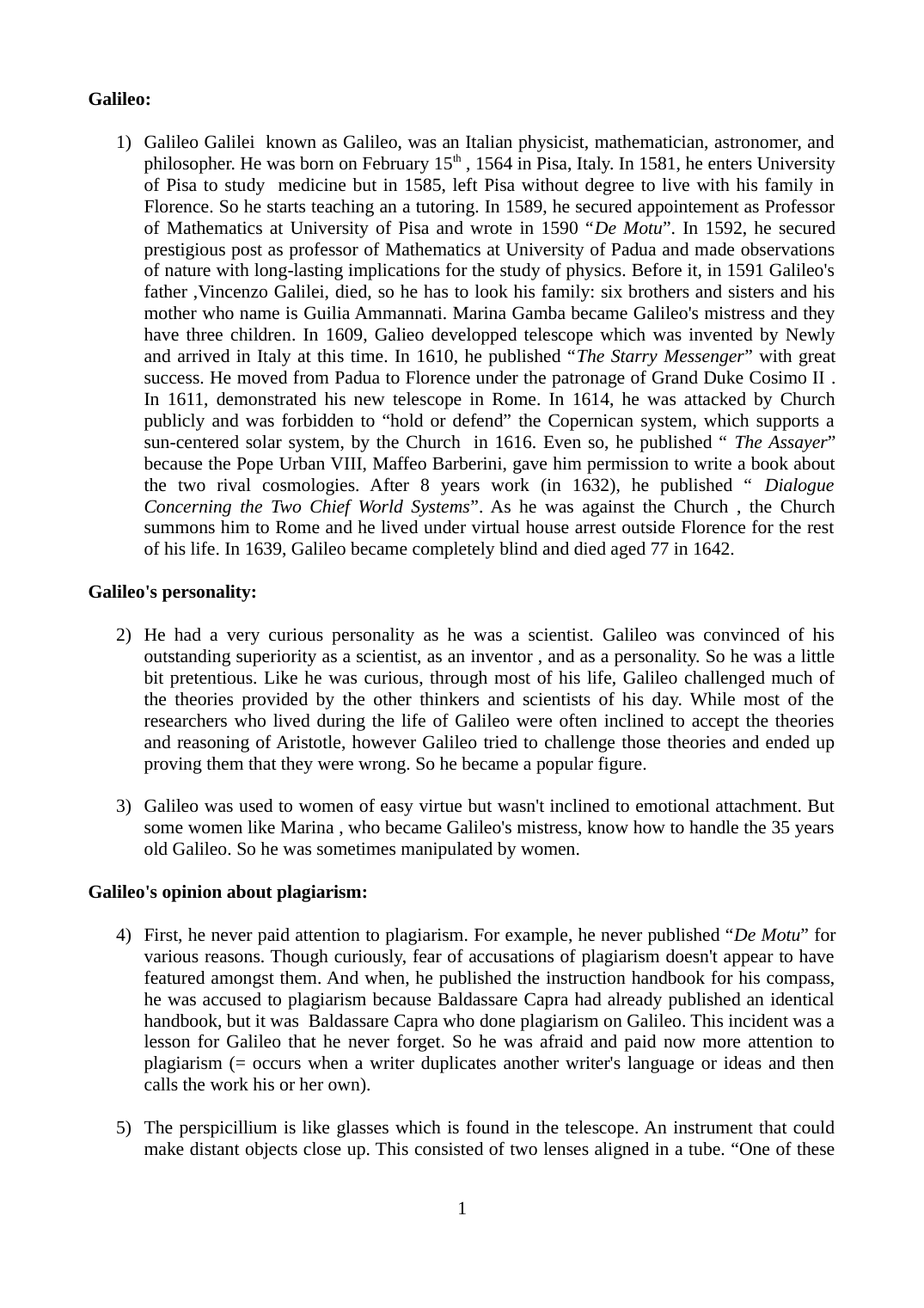GALILEO
Publié le 23/05/2020
Extrait du document
«
Galileo:
1) Galileo Galilei known as Galileo, was an Italian physicist, mathematician, astronomer, and
philosopher.
He was born on February 15 th
, 1564 in Pisa, Italy.
In 1581, he enters University
of Pisa to study medicine but in 1585, left Pisa without degree to live with his family in
Florence.
So he starts teaching an a tutoring.
In 1589, he secured appointement as Professor
of Mathematics at University of Pisa and wrote in 1590 “ De Motu ”.
In 1592, he secured
prestigious post as professor of Mathematics at University of Padua and made observations
of nature with long-lasting implications for the study of physics.
Before it, in 1591 Galileo's
father , Vincenzo Galilei, died, so he has to look his family: six brothers and sisters and his
mother who name is Guilia Ammannati.
Marina Gamba became Galileo's mistress and they
have three children.
In 1609, Galieo developped telescope which was invented by Newly
and arrived in Italy at this time.
In 1610, he published “ The Starry Messenger ” with great
success.
He moved from Padua to Florence under the patronage of Grand Duke Cosimo II .
In 1611, demonstrated his new telescope in Rome.
In 1614, he was attacked by Church
publicly and was forbidden to “hold or defend” the Copernican system, which supports a
sun-centered solar system, by the Church in 1616.
Even so, he published “ The Assayer ”
because the Pope Urban VIII, Maffeo Barberini, gave him permission to write a book about
the two rival cosmologies.
After 8 years work (in 1632), he published “ Dialogue
Concerning the Two Chief World Systems ”.
As he was against the Church , the Church
summons him to Rome and he lived under virtual house arrest outside Florence for the rest
of his life.
In 1639, Galileo became completely blind and died aged 77 in 1642.
Galileo's personality:
2) He had a very curious personality as he was a scientist.
Galileo was convinced of his
outstanding superiority as a scientist, as an inventor , and as a personality.
So he was a little
bit pretentious.
Like he was curious, through most of his life, Galileo challenged much of
the theories provided by the other thinkers and scientists of his day.
While most of the
researchers who lived during the life of Galileo were often inclined to accept the theories
and reasoning of Aristotle, however Galileo tried to challenge those theories and ended up
proving them that they were wrong.
So he became a popular figure.
3) Galileo was used to women of easy virtue but wasn't inclined to emotional attachment.
But
some women like Marina , who became Galileo's mistress, know how to handle the 35 years
old Galileo.
So he was sometimes manipulated by women.
Galileo's opinion about plagiarism:
4) First, he never paid attention to plagiarism.
For example, he never published “ De Motu ” for
various reasons.
Though curiously, fear of accusations of plagiarism doesn't appear to have
featured amongst them.
And when, he published the instruction handbook for his compass,
he was accused to plagiarism because Baldassare Capra had already published an identical
handbook, but it was Baldassare Capra who done plagiarism on Galileo.
This incident was a
lesson for Galileo that he never forget.
So he was afraid and paid now more attention to
plagiarism (= occurs when a writer duplicates another writer's language or ideas and then
calls the work his or her own).
5) The perspicillium is like glasses which is found in the telescope.
An instrument that could
make distant objects close up.
This consisted of two lenses aligned in a tube.
“One of these
1.
»
↓↓↓ APERÇU DU DOCUMENT ↓↓↓
Liens utiles
- Galileo.
- Galilée Galileo Galilei naquit à Pise où il étudia la médecine avant de se consacreraux mathématiques et à la physique.
- Galileo Galilei
- Galileo Ferraris par Pietro PagniniConsultore al Museo della Storia, Florence En 1884,
- Galileo Ferraris Galileo Ferraris est né le 30 octobre 1847, à Livourne.

































